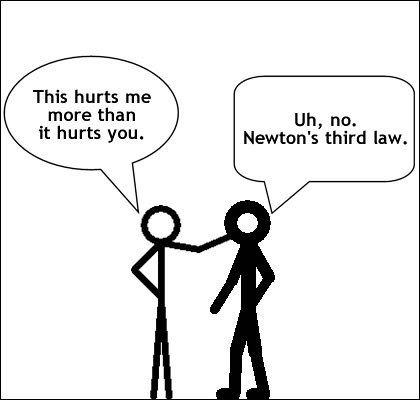Skip to comments.
Science publishing: The trouble with retractions
Nature News ^
| 10/6/2011
| Richard Van Noorden
Posted on 10/06/2011 8:27:07 AM PDT by toma29
This week, some 27,000 freshly published research articles will pour into the Web of Science, Thomson Reuters' vast online database of scientific publications. Almost all of these papers will stay there forever, a fixed contribution to the research literature. But 200 or so will eventually be flagged with a note of alteration such as a correction. And a handful — maybe five or six — will one day receive science's ultimate post-publication punishment: retraction, the official declaration that a paper is so flawed that it must be withdrawn from the literature.
It is reassuring that retractions are so rare, for behind at least half of them lies some shocking tale of scientific misconduct — plagiarism, altered images or faked data — and the other half are admissions of embarrassing mistakes. But retraction notices are increasing rapidly. In the early 2000s, only about 30 retraction notices appeared annually. This year, the Web of Science is on track to index more than 400 (see 'Rise of the retractions') — even though the total number of papers published has risen by only 44% over the past decade.
Perhaps surprisingly, scientists and editors broadly welcome the trend. "I don't think there's any doubt that we're detecting more fraud, and that systems are more responsive to misconduct. It's become more acceptable for journals to step in," says Nicholas Steneck, a research ethicist at the University of Michigan in Ann Arbor. But as retractions become more commonplace, stresses that have always existed in the system are starting to show more vividly.
(Excerpt) Read more at nature.com ...
TOPICS: Crime/Corruption; Government; News/Current Events
KEYWORDS: globalwarming; gore; hockeystick; science; stringtheory
But the science is settled. Right?
1
posted on
10/06/2011 8:27:15 AM PDT
by
toma29
To: toma29
I don't have a problem with a publication being retracted when there are errors or fabrication of findings found.
Incidentally, almost all scientific articles and books were created with FREE and easily available TeX Software that runs on Windows, Apple and Linux systems. TeX is used (and has been used for over 35 years) for text formatting and typography. Authors should initially focus on the structured substance of their information rather than a document's appearance.
2
posted on
10/06/2011 8:42:20 AM PDT
by
pyx
(Rule#1.The LEFT lies.Rule#2.See Rule#1. IF THE LEFT CONTROLS THE LANGUAGE, IT CONTROLS THE ARGUMENT.)
To: toma29
It is the very nature of science that it will never completely settle anything ... ever.
To: AdmSmith; bvw; callisto; ckilmer; dandelion; ganeshpuri89; gobucks; KevinDavis; Las Vegas Dave; ...
Thanks toma29.
"I don't think there's any doubt that we're detecting more fraud, and that systems are more responsive to misconduct. It's become more acceptable for journals to step in," says Nicholas Steneck, a research ethicist at the University of Michigan in Ann Arbor.
· String Theory Ping List ·

· Join · Bookmark · Topics · Google ·
· View or Post in 'blog · post a topic · subscribe ·
4
posted on
10/06/2011 7:45:37 PM PDT
by
SunkenCiv
(It's never a bad time to FReep this link -- https://secure.freerepublic.com/donate/)
To: toma29
“The right to search for truth implies also a duty; one must not
conceal any part of what one has recognized to be true.”
—Albert Einstein
5
posted on
10/06/2011 8:00:03 PM PDT
by
LomanBill
(Animals! The DemocRats blew up the windmill with an Acorn!)
To: pyx
LaTeX is pretty neat. It can make a resume stand out, for example.
To: MetaThought
I agree. I use LaTeX and TeX a lot. I am slowly weaning myself off a dependence on word processors so I end up with what I believe are far superior results using LaTeX and TeX. Since they are both free, its become a nobrainer. :)
7
posted on
10/06/2011 11:13:47 PM PDT
by
pyx
(Rule#1.The LEFT lies.Rule#2.See Rule#1. IF THE LEFT CONTROLS THE LANGUAGE, IT CONTROLS THE ARGUMENT.)
To: Springman; sergeantdave; cyclotic; netmilsmom; RatsDawg; PGalt; FreedomHammer; queenkathy; ...
MICHIGAN PING LIST
Please freepmail me if you wish to be added or dropped from the mitten ping.
"Ethics" and "Ann Arbor" in the same sentence--isn't that a sign of the coming apocalypse?
8
posted on
10/07/2011 4:51:34 AM PDT
by
grellis
(I am Jill's overwhelming sense of disgust.)
To: toma29
To Drummond Rennie, deputy editor of the Journal of the American Medical Association, there are two obvious reasons for obscure retraction notices: "fear and work." The fear factor, says Wager, is because publishers are very frightened of being sued. "They are incredibly twitchy about publishing anything that could be defamatory," she says.
Blame the lawyers!
9
posted on
10/07/2011 6:12:23 AM PDT
by
stayathomemom
(Beware of kittens modifying your posts.)
To: toma29
The science is as settled as the lash in my right eye. My lash has more rights once I dig the thing out BTW. Let us please talk science.
10
posted on
10/07/2011 7:02:13 PM PDT
by
allmost
Disclaimer:
Opinions posted on Free Republic are those of the individual
posters and do not necessarily represent the opinion of Free Republic or its
management. All materials posted herein are protected by copyright law and the
exemption for fair use of copyrighted works.
FreeRepublic.com is powered by software copyright 2000-2008 John Robinson
